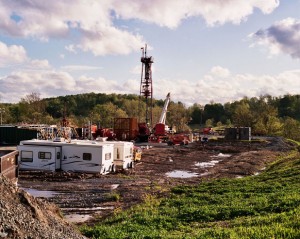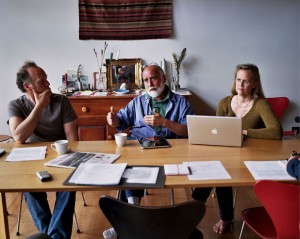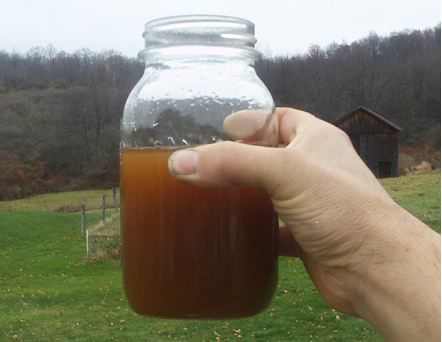Onshore Drilling Disasters Waiting to Happen: An Interview With 'Gasland' Director Josh Fox
June 19, 2010Josh Fox on The Daily Show with Jon Stewart
June 22, 2010
A shale-gas drilling and fracking site in Dimock, Pennsylvania.
Early on a spring morning in the town of Damascus, in northeastern Pennsylvania, the fog on the Delaware River rises to form a mist that hangs above the tree-covered hills on either side. A buzzard swoops in from the northern hills to join a flock ensconced in an evergreen on the river’s southern bank.
Stretching some 400 miles, the Delaware is one of the cleanest free-flowing rivers in the United States, home to some of the best fly-fishing in the country. More than 15 million people, including residents of New York City and Philadelphia, get their water from its pristine watershed. To regard its unspoiled beauty on a spring morning, you might be led to believe that the river is safely off limits from the destructive effects of industrialization. Unfortunately, you’d be mistaken. The Delaware is now the most endangered river in the country, according to the conservation group American Rivers.
That’s because large swaths of land—private and public—in the watershed have been leased to energy companies eager to drill for natural gas here using a controversial, poorly understood technique called hydraulic fracturing. “Fracking,” as it’s colloquially known, involves injecting millions of gallons of water, sand, and chemicals, many of them toxic, into the earth at high pressures to break up rock formations and release natural gas trapped inside. Sixty miles west of Damascus, the town of Dimock, population 1,400, makes all too clear the dangers posed by hydraulic fracturing. You don’t need to drive around Dimock long to notice how the rolling hills and farmland of this Appalachian town are scarred by barren, square-shaped clearings, jagged, newly constructed roads with 18-wheelers driving up and down them, and colorful freight containers labeled “residual waste.” Although there is a moratorium on drilling new wells for the time being, you can still see the occasional active drill site, manned by figures in hazmat suits and surrounded by klieg lights, trailers, and pits of toxic wastewater, the derricks towering over barns, horses, and cows in their shadows.
The real shock that Dimock has undergone, however, is in the aquifer that residents rely on for their fresh water. Dimock is now known as the place where, over the past two years, people’s water started turning brown and making them sick, one woman’s water well spontaneously combusted, and horses and pets mysteriously began to lose their hair.
continued…

Damascus Citizens for Sustainability activists Joe Levine, Pat Carullo, and Jane Cyphers
All of this is mind-boggling to activists like Pat Carullo. A 56-year-old graphic designer, Carullo is a member of Damascus Citizens for Sustainability, a group that opposes hydraulic fracturing in the Delaware River Watershed. Tan and animated, with a white beard, he has an earthy quality and is wearing an eagle medallion around his neck when I meet him in Damascus.
Carullo and other members of Damascus Citizens have homes in this area. They created the group when it became clear that drilling was poised to begin on leased land in the watershed and were galvanized in 2008 when a large oil-and-gas company, Chesapeake, drilled an exploratory well in their county and signs of a spill—dying trees and vegetation—appeared at the site. (After Damascus Citizens filed a complaint about the matter, the Pennsylvania D.E.P. served Chesapeake a notice of violation, saying that traces of petrochemicals had been detected in the soil around the well site. While Chesapeake director Brian Grove states that “a detailed review of our operations reveals no events or operational deficiencies that would have negatively impacted the environment,” Pennsylvania D.E.P. official Tom Rathbun told Vanity Fair that chlorides from the shale returned as wastewater seem to have been responsible for killing the vegetation.”) At the time, the position the group took was radical: no fracking in the Upper Delaware watershed, period. Since then, others have come around to it. Damascus Citizens is now at the center of efforts around the country to spread awareness about the hazards of fracking, study its effects more thoroughly, address the gaping lack of regulation, and slow down the rush of leasing and drilling that has swept so much of the country. A documentary about natural-gas drilling and fracking, Gasland, which won the Special Jury Prize for Documentary at this year’s Sundance Film Festival and debuts on HBO this month, is dedicated to the group.



